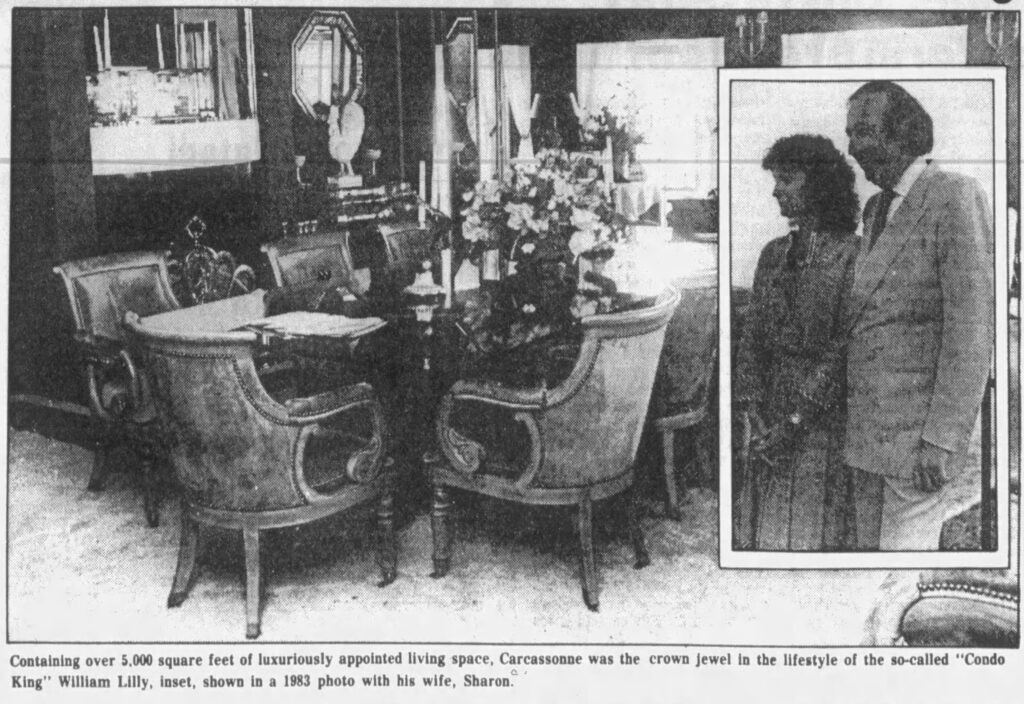My jaw tumbled to the floor when I stumbled upon a story from the Dec. 23, 1988 edition of The Daily Evening Item featuring a photo of a home on Marblehead Neck known simply as “Carcassonne,” and a headline dramatically blaring “Paradise Lost.” The image was so striking — essentially a castle carved into the Neck overlooking the ocean — that it compelled not just the writing of this column, but also my colleague Emma Fringuelli’s “Historic Building of the Week.”
In 1988, The Item wrote that inside the gates of Carcassonne, a “champagne world spreads out.” The Atlantic Ocean crashed at its cliffs, Rolls Royces were parked in the driveway, and oh, by the way, it also had a pool and a helipad. That year, though, marked an interesting turning point for the sprawling compound — it was foreclosed on.
At the time, William Lilly, the so-called “Condo King,” owned the home, having purchased it for $1.2 million in 1982. (Equivalent to $3.9 million in Nov. 2023, roughly half of the Zillow estimate for the home, which is $8.43 million). According to the registry of deeds, Lilly refinanced the property 12 times between 1982 and 1988. The assessor’s office listed the property as being worth $2.4 million, and the carriage house, or garage, at $677,800, good for a total valuation north of $3 million. Carol Thorn, a realtor with Lighthouse Realty, told The Item the entire estate was worth $5 million.

“There are only three to five properties on the New England Coast that have gone for more than $2 million,” Thorn is quoted as saying, adding that Carcassonne was on par with the “infamous” Von Bulow Estate in Newport, R.I.
A legal notice indicated the castle’s fate: Capitol Bank and Trust Company would move to foreclose on the property by January 1989.
Lilly did not talk to The Item about the foreclosure.
He purchased the home from George Butler after just 12 years in the real estate business, at age 35. At the time, he called the purchase a “dream come true.”
Lilly drew most of his wealth from Baby Boomers seeking entry-level real estate ventures in the condo market. In all, he developed more than 1,000 condos during that time, earning himself the “Condo King” moniker.
A native of Revere, Lilly got into the real estate business at age 21, when he formed the Darcy Realty Trust. But, it wasn’t all smooth sailing for Lilly, who developed a backlog of bills and complaints in Essex County District Court, leading him to declare bankruptcy in 1972. Then, he declared assets of $388.69 and liabilities exceeding $202,000.
But, Lilly eventually clawed his way back to success as what the paper described an “aggressive real estate broker operating during boom years.” His wife, Sharon, also generated profits with her own business deals. In the late ’70s, he began buying suburban apartment buildings to convert them to condominiums. Those developments “blossomed,” the paper reported, and by 1981 he claimed to be the state’s leading condo developer. And so, “Condo King, Inc.” was formed.
The shine faded fast for Lilly. By 1985, he was “under siege” by unsatisfied customers, contractors, and suppliers for allegedly failing to pay bills and contract disputes.
With foreclosure imminent, the future of the property was uncertain.
“There really is no oceanfront property like that available anymore,” Thorn explained. “It would be a terrible shame if he subdivided those lots.”
From Carcassonne, a person could reportedly see lights from Cape Ann to Cape Cod. The home’s 14 rooms offer 5,382 square feet of living space. The home also featured oceanfront patios, gardens, and a circular driveway, The Item reported.

